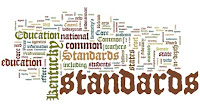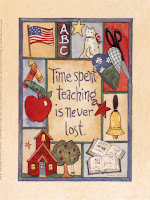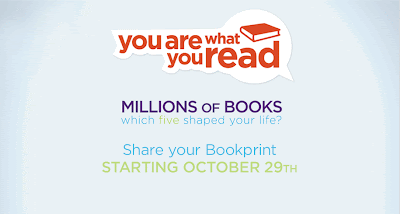If you’ve been in education long enough, the refrain, “The pendulum swings again,” is not new to you. With the Common Core State Standards, many teachers have expressed a concern that as we usher in this new era, we’re saying good-bye to our latest and greatest and moving on to yet something else that is new. I share this concern and I’ve been watching this unfold very closely. I have a lot questions, and one of my biggest is about the suggestion that all students need to read grade level complex text and the way in which to go about this is through close, careful reads. I come from the school of strategy instruction. I’ve taught children how to connect, infer, question, determine importance, visualize, and synthesize with success. The suggestion that I abandon this practice in exchange for something that seems to be brand new to the educational landscape makes me say, “What gives?”
Reform
Reading Volume in the Age of the Common Core
In the Face of Fear
Today, I’ve been working on organizing and outlining some of the ideas that I have for what I dream will one day become a book for teachers about teaching literacy. Broad topic, I know. But right now, I’m in the gathering and envisioning stage of my writing process. I’m relishing going back through the volumes that I have been collecting over the years and reacquainting with my old thoughts and experiences as a teacher. I find myself making notes in the margins and asking myself questions. My questions prompt me to want to write more and when I do, I find myself thinking about things that surprise me. Writing more leads me to new a-has and I get excited…and then worried because I wonder, where does this process end? How could I possibly write an entire book if my thinking keeps changing and growing as I springboard from one idea to the next? In some ways, the process is exhilarating and liberating but in other ways, it’s absolutely paralyzing. I’m so scared, I want to put away my notebook and binder and pen and start scrubbing toilets. Anything has got to be better than this, I think as I turn my head toward the bulletin board next to my desk and read the quote from Eleanor Roosevelt glaring at me from the center:
Teach them Well
Left to their own devices, my boys, aged 10 and 7, would grunt hello in the morning, leave their pants of the floor for me to pick up, and command me to fix them a snack when they were hungry. I find these behaviors rude and appalling and work very hard to correct these obnoxious habits. When they bark orders, I remind them to say please and thank you. In spite of their angry protests, I make them clean up the bits of construction paper they sprayed all over the floor in the great confetti experiment. They are responsible for putting their clothes in the hamper and their dirty dishes in the sink and as a result, people often tell me how polite and pleasant my boys are. I am always flattered and hear myself saying, “yes, they are such good boys,” as if their affability were innate and had nothing to do with me at all.
I recently visited a first grade classroom and modeled a lesson about how to help children recognize words they don’t know in their reading. Following the lesson, the six year olds in this class grabbed their book baggies, found their cozy spot in the classroom, and read for fifteen minutes. There was a quiet buzz in the classroom as children spoke softly into their whisper phones or shared something too good to be missed with a friend sitting near them. The tenor of this independent reading period was focused and productive. When I complemented the teacher on the efficacy of her reading workshop, she smiled and said, “It’s because I have such a good group this year.”
It surprised me to hear her say this. Implied in her comment was the notion that what I saw might not be possible with a different group of students. In the same way that I attribute my own children’s pleasantries to something they were born with, she saw her success as a workshop teacher as dependent upon her students. I quickly reminded her that while it’s always nice to work with a “good group,” our successes as educators are directly linked to what we know about best practice and the daily decisions we make about how to implement this knowledge. While “a good group” might facilitate implementation, what I saw was directly linked to good teaching.
As educators, we need to think hard about educational responsibility. When things go well, it is not just because our students are “smart” or “working really hard.” It’s because we are doing something right as teachers. In the same sense, when things are not going well, it’s not just because children are “difficult” or “come from poor homes” or “distractible.” It’s because we need to do something different to reach those students. While it is easy, and arguably natural, to attribute both positive and negative learning outcomes to children, there is really but one direction to point the finger for the success and failure of our students: at ourselves. What students learn and how well they learn is dictated by the quality of the person delivering the instruction: children’s educations are our responsibility. The more we know, the better we teach. The better we teach, the better they learn.
You are What You Read
On Friday, October 29th, Scholastic is launching You Are What You Read, an initiative for people to think about and reflect on which five books have shaped their lives. When I first read about this, I was intrigued. I found myself thinking back over many, many years trying to figure out which books have molded me into the person that I am. My memories of childhood reading are somewhat limited because I was a sporadic reader. When I’d finished Beverly Cleary and Judy Blume by fourth and fifth grade, I didn’t read again till eighth grade when I discovered V.C. Andrews. After that, I didn’t read again until I was a sophomore. At that time I got into The Clan of the Cave Bear (Amazon Affiliate Link) series and fell in love with Ayla and all things Neanderthal (maybe that explains my high school boyfriend?)
But shaped me as a person? Certainly these books entertained me, but they didn’t leave me in a state of pensive reflection. In fact, I can’t help but think that as a child, reading was a bit passive for me. When I finished a book, I slammed the cover shut and when outside to play. It has only been in adulthood that I have discovered the lingering effects of reading. Now, it seems that everything I pick up moves me and changes me in both small and big ways. Now, narrowing it down to five is difficult. However, after much thought, these are the five titles that make me who I am:
Who Moved my Cheese by Dr. Spencer Johnson
Who Moved My Cheese (Amazon Affiliate Link) came into my life at exactly the time I needed it to. A few years back, my career felt at a crossroads. My children were reaching school age and I wondered if I wanted to go back into the classroom or continue working as a staff developer. As a staff developer, I felt I had been talking the same game for five years and what I had to offer was getting stale. Who Moved My Cheese gave me a new way to look at and think about making change and helped me to realize that my block of cheese was whittling away and the time had come to find new cheese. Reading this book unleashed in me an intense quest for new “cheese” that I am hoping never ends…
What Really Matters for Struggling Readers (Amazon Affiliate Link) by Richard Allington
On my quest for new cheese, I found this book. Never has one book ever clarified in such simple terms what needs to change and happen in order to help children on the path to greater reading proficiency. In this book, Richard Allington spells out what children need to become more proficient: Books that match their ability level, practice (lots of it), and expert guidance. As far as books go, for me, this one was transformational. Now, every lesson I teach mirrors these tenets.
Outliers (Amazon Affilate Link) by Malcom Gladwell
Richard Allington told me that practice is really important if we want to help children become more proficient readers, but in Outliers, Malcom Gladwell sealed the deal. I have always felt a bit envious of the super talented and the super successful. Why not me, I’d wonder and shake my head at picking the short straw in the “gifts” department. Nothing has ever compelled me more or helped me to reach new understandings about how the cards fall more than Outliers. Malcom Gladwell helped me to realize that talent and success are more the result of hard work and proximity than they are luck of the draw.
A Whole New Mind (Amazon Affiliate Link) by Daniel Pink
In the way that Malcom Gladwell helped me to think differently about success, Daniel Pink helped me think differently about everything. As I read this book, I felt a call to action. While I think Daniel Pink meant to speak to a wide audience of service providers and business people, I couldn’t help but wonder what we need to do differently in education “to think outside of the box.” Daniel Pink showed me what can happen when we think and do things differently. The results can be transformational. I embrace reform because of this book.
Hey World, Here I Am (Amazon Affiliate Link) by Jean Little
In the spirit of looking with “a whole new mind,” this is the book that never ceases to surprise me of its potential. Of all the books I have listed here, this is the one I have known the longest. It has been a text that I have used since the inception of my career. It is filled with stories that I keep going back to for the purpose of demonstrating absolutely everything and anything I need to. Every time I read these little vignettes, I see new possibilities. I love it because I couldn’t teach without it.
So, these are the titles that have shaped me. Now I want to know, which titles have molded you?





